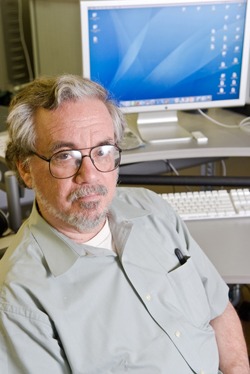Filed Under > Curriculum
TC's First Online Master's Program
As a former elementary school teacher, Jean-Anne O'Neill is tired of waiting around for education to reform itself. Technology is the key to improvement, she says-'"not merely a potential amplifier for what already exists, but a tool that can radically change what teachers and students do in schools and how they do it.
As a former elementary school teacher, Jean-Anne O’Neill is tired of waiting around for education to reform itself. Technology is the key to improvement, she says—not merely a potential amplifier for what already exists, but a tool that can radically change what teachers and students do in schools and how they do it.
As the mother of three children, however, O’Neill has limited time and mobility to lead the revolution. So earlier this past spring, at the urging of a friend, she investigated the new online master’s degree program in Computing and Education that TC will offer for the first time this coming fall through a collaboration between its Department of Math, Science and Technology, Center for Technology and School Change (CTSC) and Center for Educational Outreach and Innovation (CEO&I). O’Neill says she was “thrilled” at the course offerings—“Equity, Ethical, and Social Issues in Educational Technology”; “Telecommunications, Distance Learning, and Collaborative Interchange”; “Computers, Problem Solving, and Cooperative Learning”; “Technology and School Change” and others—and the faculty (Howie Budin, John Black, Ellen Meier, Bob Taylor and others), and was more thrilled still after exchanging emails with Budin, who organized the program and brought together its various technology platforms.
“There are many excellent applications available for different purposes related to online learning,” says Budin, Co-Director with Meier of CTSC. “For instance, we’re planning to use an online course platform for some functions, like asynchronous discussion; a live Web video meeting application; and our library’s PocketKnowledge for group storage of files.”
Budin adds that TC’s Gottesman Libraries team is working with CTSC on the program’s Web site and on digital tools for students’ use in conducting library research; Academic Computing is facilitating licenses and management of new software; and the program was designed in collaboration with TC’s program in Communication, Computing and Technology in Education.
“We’ll also have a blog for program participants, for exploring themes beyond the courses,” he says. “We’re hoping to create a sense of community within the whole program that helps students learn from each other and share information about what they’re doing in their teaching. And we’re hoping that graduates of the program will continue to participate in this community.”
On one level, the new venture does not signify any massive change. After all, TC has been offering online courses for many years, and its Intensive Master’s Program in Computing and Technology has been producing technology leaders for the past two decades.
Yet the new degree program is the first ever offered online by the College in any subject—and that makes ensuring its quality an even greater priority than usual.
“We want to be absolutely certain that in any distance learning experience offered by TC, the content and the experience are every bit as rich as they would be in the classroom,” says Associate Dean Bill Baldwin. “The Computing in Education program is a good way to test the waters, both because the medium fits the message, and because many of the necessary elements were already in place. By taking them online, we’re building on the intellectual capital of the faculty and the dynamic potential of the technology itself.”
In fact, Budin argues that there are dimensions to online learning that the traditional classroom experience can’t match.
“We know from research and experience teaching online that asynchronous discussion forums produce wonderful writing,” he says. “When students have the chance to look back over other people’s contributions to a discussion, and to think about what they want to say before they post it, the result is often much more reflective and substantive than what they might say in a face-to-face discussion. Asynchronous, written discussion forums add a valuable dimension missing from in-person classes.”
What about the advantages of being in class, knowing your classmates, meetings in the halls and cafeteria, or speaking in class? Budin believes the gap can be bridged through platforms like Blackboard, Moodle or TC’s Classweb, and also Adobe Connect for live video web meetings. For techies like O’Neill, being on the “bleeding edge” of such new cyber territory is part of the education process—and part of the fun.
“It is my hope that this program continues to nourish my love of technology and sharpens my skills in the area of technology leadership,” she wrote in a recent email. “As an agent of change, I would love to see children using technology as they engage in higher order thinking skills, to creatively solve problems and expand their horizons.”
Published Thursday, Jul. 19, 2007
